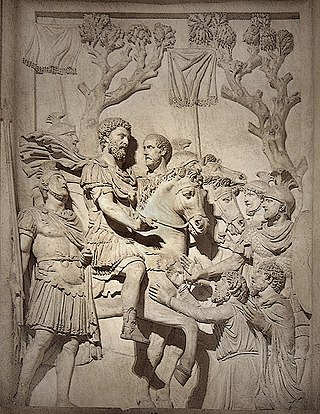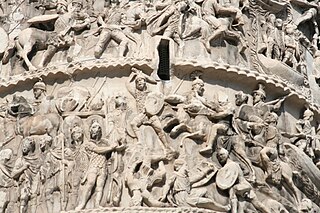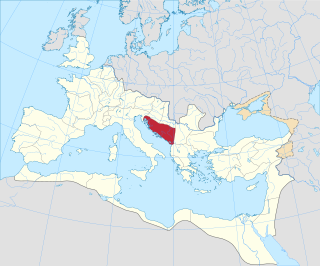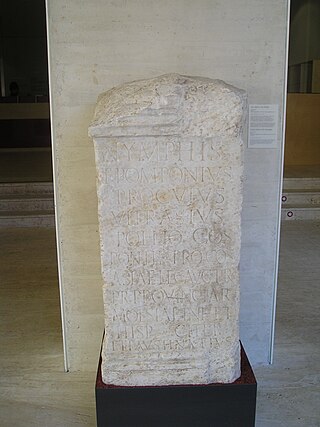
Marcus Aurelius Antoninus was Roman emperor from 161 to 180 AD and a Stoic philosopher. He was a member of the Nerva–Antonine dynasty, the last of the rulers later known as the Five Good Emperors and the last emperor of the Pax Romana, an age of relative peace, calm, and stability for the Roman Empire lasting from 27 BC to 180 AD. He served as Roman consul in 140, 145, and 161.
The 170s decade ran from January 1, 170, to December 31, 179.

Lucius Aurelius Verus was Roman emperor from 161 until his death in 169, alongside his adoptive brother Marcus Aurelius. He was a member of the Nerva-Antonine dynasty. Verus' succession together with Marcus Aurelius marked the first time that the Roman Empire was ruled by more than one emperor simultaneously, an increasingly common occurrence in the later history of the Empire.

Tiberius Claudius Pompeianus was a politician and military commander during the 2nd century in the Roman Empire. A general under Emperor Marcus Aurelius, Pompeianus distinguished himself during Rome's wars against the Parthians and the Marcomanni. He was a member of the imperial family due to his marriage to Lucilla, a daughter of Marcus Aurelius, and was a key figure during the emperor's reign. Pompeianus was offered the imperial throne three times, though he refused to claim the title for himself.
Gaius Avidius Cassius was a Syrian Roman general and usurper. He was born in Cyrrhus, and was the son of Gaius Avidius Heliodorus, who served as praefectus or governor of Roman Egypt, and Julia Cassia Alexandra, who was related to a number of royal figures, including her descent from both Augustus and Herod the Great. He began his military career under Antoninus Pius, rising to the status of legatus legionis. He served during the Parthian war of Lucius Verus, in which he distinguished himself, for which he was elevated to the Senate, and later made Imperial legate. During the Bucolic War, he was given the extraordinary title of Rector Orientis, giving him Imperium over all of the eastern provinces of the Roman Empire.
Marcus Statius Priscus Licinius Italicus was a Roman senator and general active during the reigns of Hadrian, Antoninus Pius, and Marcus Aurelius. Contemporary sources refer to him as Marcus Statius Priscus or simply Statius Priscus. He was consul for the year 159 as the colleague of Plautius Quintillus; Priscus was one of only two homines novi to attain the ordinary consul in the reigns of Antoninus Pius and Marcus Aurelius.

The Marcomannic Wars were a series of wars lasting from about 166 until 180 AD. These wars pitted the Roman Empire against principally the Germanic Marcomanni and Quadi and the Sarmatian Iazyges; there were related conflicts with several other Germanic, Sarmatian and Gothic peoples along both sides of the whole length of the Roman Empire's northeastern European border, the river Danube.

Pannonia Superior was a Roman province created from the division of Pannonia in 103 AD, its capital in Carnuntum. It overlapped in territory with modern-day Hungary, Croatia, Austria, Slovakia, and Slovenia.
Gaius Claudius Maximus was a Roman politician, a Stoic philosopher and a teacher of Marcus Aurelius. No works by him are known to exist; however, he is mentioned in a few prestigious works from classical literature.

Dalmatia was a Roman province. Its name is derived from the name of an Illyrian tribe called the Dalmatae, which lived in the central area of the eastern coast of the Adriatic Sea. It encompassed the northern part of present-day Albania, much of Croatia, Bosnia and Herzegovina, Montenegro, Kosovo and Serbia, thus covering an area significantly larger than the current Croatian region of Dalmatia. Originally this region was called Illyria or Illyricum.

Marcus Valerius Maximianus was an important Roman general of the period of the Marcomannic Wars during the reign of Marcus Aurelius. He was born in the Roman colony of Poetovio, where his father, also called Marcus Valerius Maximianus, was a local censor and priest. He was decorated for services in the Parthian war of Lucius Verus and was appointed by Marcus Aurelius to ensure the armies in Pannonia were supplied by boats on the Danube.

The reign of Marcus Aurelius began with his accession on 7 March 161 following the death of his adoptive father, Antoninus Pius, and ended with his own death on 17 March 180. Marcus first ruled jointly with his adoptive brother, Lucius Verus. They shared the throne until Lucius' death in 169. Marcus was succeeded by his son Commodus, who had been made co-emperor in 177.

Titus Pomponius Proculus Vitrasius Pollio was a Roman senator, who held several imperial appointments during the reign of Marcus Aurelius. He was suffect consul in an undetermined nundinium around 151; he was a consul ordinarius in the year 176 with Marcus Flavius Aper as his colleague.
Gaius Domitius Dexter was a Roman senator who was appointed consul twice: firstly as suffect consul prior to AD 183, and secondly as ordinary consul in AD 196 with Lucius Valerius Messalla Thrasea Priscus as his colleague.
Gaius Pomponius Bassus Terentianus was a Roman military officer and senator.
Pollienus Auspex was a Roman military officer and senator who was appointed suffect consul sometime between AD 170 and 174. His praenomen is thought to be Tiberius.
Gaius Caesonius Macer Rufinianus was a Roman military officer and senator who was appointed suffect consul in around AD 197 or 198. He was the first member of gens Caesonia to hold a consulship.

Lucius Caesonius Lucillus Macer Rufinianus was a Roman military officer and senator who was appointed suffect consul probably between AD 225 and 229. Much of what we know about him comes from an inscription found on the base of a statute near Tivoli.
Gaius Arrius Antoninus was a Roman senator and jurist active in the last half of the second century AD, who held a number of offices in the emperor's service. The date when he was suffect consul is not attested, but has been estimated to be around AD 173. Edward Champlin includes him, along with Gaius Aufidius Victorinus and Tiberius Claudius Julianus, as "marked out as a special intimate of Fronto's." Champlin notes that while Victorinus received five of the surviving letters of the rhetor Fronto, "as the beloved pupil and son-in-law", Antoninus received four, taking "the place of Fronto's son."

Marcus Macrinius Avitus Catonius Vindex was a Roman senator who was active during the reign of Marcus Aurelius. Originally a member of the equestrian order, Vindex demonstrated courage and intelligence that led to his award of dona militaria and elevation into the Senate, followed by his appointment to the consulate, which Géza Alföldy dates to an undetermined nundinium around the year 175.












